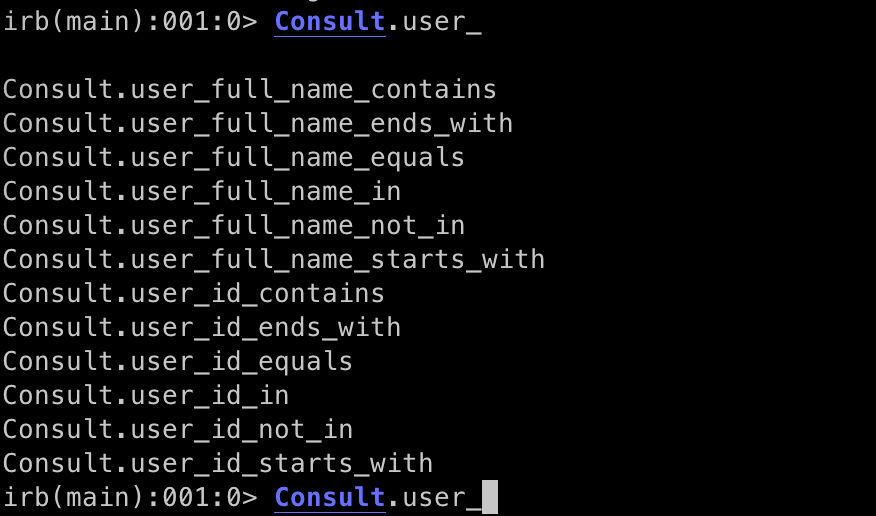Metaprograming Filters with Rails GraphQL

First off if you have no idea what Metaprogramming is or how it could apply to GraphQL in Ruby, don’t worry. Most people hear the terms and view it as magic land that few have a reason to venture into… and for the most part, they may be right. Do you really need all that overloading and extra class utils? Of course not, there are plenty of giant Ruby files. However, it does feel good when you to able to those files clean and organized for your day-to-day work.
The only assumption I’ll be making here is that you have some basic understanding of Rails scopes and GraphQL.
In fact, there’s a good article that addresses ruby metaprogramming here: https://www.toptal.com/ruby/ruby-metaprogramming-cooler-than-it-sounds
Today, I wanted to address how the mystical unknown of Ruby’s ClassMethods helped to create some solid GraphQL helpers for filtering data.
The Scenario
Let’s set up the scenario…
In GraphQL (or any API setup) you may wish to create filters for your queries. Shocker I know… but imagine ‘Jim’ needs to search through the company's past consultations by the sales rep's name or the customer's name.
“No problem, Jim!”

The Code
Let's take a look at the schema we have to work with. In this example, we have a consult that is assigned to both a user and a sales_rep. So to recap in our example Jim the sales rep needs to query Consults based on the folks’ names.
create_table "users", force: :cascade do |t|
t.text "email", null: false
t.text "first_name", null: false
t.text "last_name", null: false
t.text "full_name", null: false // before save join
// other values...
end
create_table "sales_reps", force: :cascade do |t|
t.text "email", null: false
t.text "first_name", null: false
t.text "last_name", null: false
t.text "full_name", null: false // before save join
// other values...
end
create_table "consults", force: :cascade do |t|
t.bigint "user_id", null: false
t.bigint "sales_rep_id", null: false
t.string "consult_type"
t.text "notes"
t.date "created_on", default: -> { "CURRENT_TIMESTAMP" }
// other values...
t.index ["sales_rep_id"], name: "index_consults_on_rep_id"
t.index ["user_id"], name: "index_consults_on_user_id"
end
Sweet, not too bad of a request — let's take a look at what this should look like w/ GraphQL and work backward a bit.
query($userFullName: StringFilters, $salesRepFullName: StringFilters){
consults(userFullName: $userFullName, salesRepFullName: $salesRepFullName) {
id
notes
user {
id
firstName
lastName
}
salesRep {
id
firstName
lastName
}
}
}
Wait! what are StringFilters ?!
Does the end user want an exact match or a fuzzy match? include a set of values? exclude? do they need a range of values? Who knows…
When building out an API I never want to assume how folks want to interact with the endpoints I’m building. They should be dynamic and flexible. Today it's Jim, tomorrow it's Pam, then the whole accounting firm drops a bomb of chili on our app.
Let’s simply protect ourselves and build out a Filter class that can be flexible enough to support folks as we continue to grow up front.
module Types
module Filters
class StringFilters < Types::Base::BaseInputObject
description 'A way to filter string fields.'
argument 'contains', String, required: false
argument 'startsWith', String, required: false
argument 'endsWith', String, required: false
argument 'equals', String, required: false
argument 'gt', String, required: false
argument 'gte', String, required: false
argument 'lt', String, required: false
argument 'lte', String, required: false
argument 'notIn', [String], required: false, description: "['value1', 'value2']"
argument 'in', [String], required: false, description: "['value1', 'value2']"
end
end
end
The ‘issue’
Here is where we start to get into our issue, at some point, we need to resolve these filters and get said data… the issue we have no clue what filters the end consumer may use. That’s kinda the point. While we could litter our GQL resolver with a ton of logic we really want to let our Models and Active Record handle this kind of thing. So far nothing has been truly GraphQL-specific. Rather we simply have a consumer asking for some filtered data.
With that in mind, lets aim to keep that logic out of GQL and in a place where we can leverage it throughout the app.
Well in rails land, that generally means adding some scope(s) to our models — let's build some scopes in our Consult model that can handle this.
scope :user_name_contains, lambda { |query|
joins(:user).where("users.full_name" ILIKE ?", '%' + sanitize_sql_like(query) + '%')
}
scope :user_name_equals, lambda { |query|
joins(:user).where("users.full_name": query)
}
Wait a second?!… hold up! Hit the brakes!

Let's think about this at scale for a second. We now have:
- A list of String Filters that could be scoped to MULTIPLE fields on my Model
- Some of those fields are tied to a relation
- What happens when Pam and Accounting actually do ask for more…
Holy cow Batman, that’s a lot of scopes to add to our models… GROSS!!
There has to be a way to keep this clean and DRY…
Solution Time
Insert some fun metaprogramming and new class utils. To be frank this stuff is always confusing to me at first so let's take a look at the end result first and we’ll chat about what’s going on.
consult.rb (Model)
class Consult < ApplicationRecord
include GqlScopeHelpers
@filterable_args = %i[sales_rep_full_name user_full_name user_id sales_rep_id created_on]
include_relational_string_filters_for(SalesRep, 'full_name')
include_relational_string_filters_for(SalesRep, 'id')
include_relational_string_filters_for(User, 'full_name')
include_relational_string_filters_for(User, 'id')
include_date_filters_for('created_on')
class User < ApplicationRecord
include GqlScopeHelpers
include_string_filters_for('full_name')
class SalesRep < ApplicationRecord
include GqlScopeHelpers
include_string_filters_for('full_name')
list_consults.rb (GQL Resolver)
module Queries
module Consults
class ListConsults < BaseQuery
type Types::ConsultType.connection_type, null: false
description 'Filter/View All Consults'
argument :sales_rep_full_name, Types::Filters::StringFilters, required: false
argument :user_full_name, Types::Filters::StringFilters, required: false
argument :user_id, Types::Filters::StringFilters, required: false
argument :sales_rep_id, Types::Filters::StringFilters, required: false
argument :created_on, Types::Filters::DateFilters, required: false
def authorized?(_query = nil)
is_sales_rep? || is_user? # helper utils from BaseQuery
end
def resolve(args = {})
# scope consults to the current user
query = ::Consult.context_user(context[:current_user])
# build up the query and apply all filters
::Consult.apply_scope_filters(query, args)
rescue StandardError => e
Sentry.capture_message("GQL: List Consults: #{e}")
raise GraphQL::ExecutionError, "Unknown Error #{e}"
end
end
end
end
end
gql_scope_helpers.rb
module GqlScopeHelpers
extend ActiveSupport::Concern
module ClassMethods
# Should match app/graphql/types/filters/string_filters.rb
def include_string_filters_for(key)
scope :"#{key}_contains", ->(query) { where("#{key} ILIKE ?", '%' + sanitize_sql_like(query) + '%') }
scope :"#{key}_starts_with", ->(query) { where("#{key} ILIKE ?", sanitize_sql_like(query) + '%') }
scope :"#{key}_ends_with", ->(query) { where("#{key} ILIKE ?", '%' + sanitize_sql_like(query)) }
scope :"#{key}_equals", ->(query) { where("#{key}": query) }
scope :"#{key}_gt", ->(query) { where("LENGTH(#{key}) > ?", query) }
scope :"#{key}_gte", ->(query) { where("LENGTH(#{key}) >= ?", query) }
scope :"#{key}_lt", ->(query) { where("LENGTH(#{key}) < ?", query) }
scope :"#{key}_lte", ->(query) { where("LENGTH(#{key}) <= ?", query) }
scope :"#{key}_not_in", ->(query) { where.not("#{key}": query) }
scope :"#{key}_in", ->(query) { where("#{key}": query) }
end
def include_relational_string_filters_for(klass, relational_field)
key = "#{klass.to_s.underscore}_#{relational_field}"
join_name = klass.name.underscore.to_sym
pluralized = join_name.to_s.pluralize
# Previously had these as .merge klass.send -- some keys collide and conflict with `merge` once compiled to SQL e.g. "full_name"
scope :"#{key}_contains", lambda { |query|
joins(join_name).where("#{pluralized}.#{relational_field} ILIKE ?", '%' + sanitize_sql_like(query) + '%')
}
scope :"#{key}_starts_with", lambda { |query|
joins(join_name).where("#{pluralized}.#{relational_field} ILIKE ?", sanitize_sql_like(query) + '%')
}
scope :"#{key}_ends_with", lambda { |query|
joins(join_name).where("#{pluralized}.#{relational_field} ILIKE ?", sanitize_sql_like(query))
}
scope :"#{key}_equals", lambda { |query|
joins(join_name).where("#{pluralized}.#{relational_field}": query)
}
scope :"#{key}_not_in", ->(query) { joins(join_name).where.not("#{pluralized}.#{relational_field}": query) }
scope :"#{key}_in", ->(query) { joins(join_name).where("#{pluralized}.#{relational_field}": query) }
end
def include_date_filters_for(key)
scope :"#{key}_equals", ->(query) { where("#{key}": query) }
scope :"#{key}_gt", ->(query) { where("#{key} > ?", query) }
scope :"#{key}_gte", ->(query) { where("#{key} >= ?", query) }
scope :"#{key}_lt", ->(query) { where("#{key} < ?", query) }
scope :"#{key}_lte", ->(query) { where("#{key} <= ?", query) }
scope :"#{key}_not_in", ->(query) { where.not("#{key}": query) }
scope :"#{key}_in", ->(query) { where("#{key}": query) }
en
# args: [{:name => {:contains => "asdf"}}, {:created_on => {:lt => "2022-09-09"} }]
def apply_scope_filters(composed_query = self, args)
args.keys.each do |arg|
next unless @filterable_args.include?(arg)
# {:contains => "asdf"}
hash = args[arg]
# .send(:name_contains, "asdf")
hash.keys.each do |key|
composed_query = composed_query.send(:"#{arg}_#{key}", hash[key])
end
end
# return compiled results
composed_query
end
end
end
Alright, I know that’s a lot but let's step through this.
The first thing you’ll notice is our GraphQL Resolver is SUPER clean with a single helper method.
::Consult.apply_scope_filters(query, args)
Our consult model is fairly clean as well considering. With seven lines of code we’ve supported:
- All the filter support for Sales Rep Names
- All the filter support for User Names
- All the support to filter through Rep Ids and User Ids
- All the support to match created dates and filter by date ranges
But how —
The magic lies in our new GQL Scope Helpers file.
Taking a look back at our original scopes, if you notice, the SQL here doesn’t really change. What does change is the Model name, Field, and Query data the end consumer will pass in. Smells like a function to me… and why stop at one filter, lets support them all!
The cool thing about using ClassMethods here is that by requiring our new helper the Model is able to run these functions when we go to build and compile. Let’s take another look at the Concern Model.
class Consult < ApplicationRecord
include GqlScopeHelpers
...
include_relational_string_filters_for(User, 'full_name')
include_relational_string_filters_for(User, 'id')
When we go to build and run our app with rails c you can actually see ALL of the scopes got applied to the model.
Neat!

So how does this work?
The last magical helper is our apply_scope_filters method and @filterable_args. Because these methods are all going to be run and compiled with the models, @filterable_args can be defined per Model. Apply Scope Filters is going to take ALL the args passed from our GraphQL endpoint (again… or other). @filterable_args is simply a guard when mapping over the args, if the key does not match one of our scope filters — we continue on. If it does… we are able to do some more magic with {model}.send This allows us to call a method, in our case a scope on the model, and continue to build our Query until we're finally ready for Active Record to do its thing.
# args: [{:name => {:contains => "asdf"}}, {:created_on => {:lt => "2022-09-09"} }]
def apply_scope_filters(composed_query = self, args)
args.keys.each do |arg|
next unless @filterable_args.include?(arg)
# {:contains => "asdf"}
hash = args[arg]
# .send(:name_contains, "asdf")
hash.keys.each do |key|
composed_query = composed_query.send(:"#{arg}_#{key}", hash[key])
end
end
# return compiled results
composed_query
end
In the end, what we are left with is a composed_query that includes ALL the allowed filters defined. Let's take that for a spin in rails c as well.

Using this in our GQL Resolver we now know that ANY combination of filters the consumer sends *should pass right through and build up to an efficient Active Record Query. Even better, with tools like Dataloader out of the box with rails-graphql — we are ensured to not loop and slam our DB for the world by accident.
Conclusion
# user.rb
class User < ApplicationRecord
include GqlScopeHelpers
include_string_filters_for('full_name')
# ...
end
# list_consults.rb
module Queries
module Consults
class ListConsults < BaseQuery
type Types::ConsultType.connection_type, null: false
argument :user_full_name, Types::Filters::StringFilters, required: false
# other args...
def resolve(args = {})
# build up the query and apply all filters
::Consult.apply_scope_filters(::Consult, args)
rescue StandardError => e
Sentry.capture_message("GQL: List Consults: #{e}")
raise GraphQL::ExecutionError, "Unknown Error #{e}"
end
end
end
end
end
So was all the setup worth it?!
Time will tell, but for this scale project, I believe so. This setup was actually simple to test e2e by ensuring that GQL filters were working as expected and giving us even more confidence in our ClassMethods helper file.
For now, all I can say is that my dev brain is a lot happier reading a slim model and resolver in comparison to the nested scope chaos it could have been. While building these methods may be overkill for some, I do enjoy the ability to quickly support the requests continuing to come in. The API is still flexible, open, and so far maintainable. That’s all we can ask for.